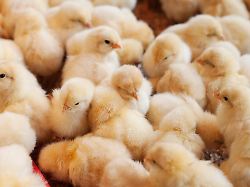Foodwatch files a complaint
Male chicks taken abroad to be killed
5/5/2023, 7:17 p.m
In early 2022, Germany will ban the killing of male chicks. Since then, many hatcheries have had to close. That’s why three companies in North Rhine-Westphalia bring their chickens abroad. Animal rights activists file a complaint, the industry complains about double standards.
Even after the ban on killing chicks in Germany, young breed cocks from German hatcheries are still being killed. According to the State Office for Nature, Environment and Consumer Protection (Lanuv), three hatcheries of laying breeds in NRW sell the male chicks abroad. “One of these three hatcheries states that the roosters are killed abroad.” A request was made to the hatcheries in November 2022, but we continue to assume that the numbers are up to date, said a spokeswoman. The consumer and animal protection organizations Foodwatch, Animal Society and the German Legal Society for Animal Protection Law filed a complaint against unknown persons with the Düsseldorf public prosecutor’s office with a view to the hatchery’s actions, as Foodwatch announced.
Since January 1, 2022, unlike in other EU countries, killing chicks has been prohibited by law in Germany. By then, almost 45 million male chicks had been killed annually because they could not be used for egg production or as broilers. The ban is not being monitored and pursued enough, said Annemarie Botzki from Foodwatch. “If the male chicks are simply carted abroad to be killed, nothing will be achieved for animal welfare.”
Number of German laying chicks halved
The Central Association of the German Poultry Industry (ZDG) said that there was basically free trade in goods in the European internal market. “Male day-old chicks are therefore freely tradable in the domestic market and may be exported from Germany,” said ZDG Managing Director Wolfgang Schleicher. The poultry farmers are still dissatisfied with the current regulation: “The introduction of the ban on killing chicks with the political crowbar was a mistake and cost the hatcheries livelihoods,” criticized Schleicher. The majority of laying hen hatcheries in Germany have since closed, only seven of 17 ZDG member companies have survived.
The Lanuv in NRW also announced that the number of hatcheries there had halved in 2022 as a result of the national ban on killing chicks. Raising the roosters costs money – which competitors abroad, where there is no ban on killing, can save. According to Schleicher, the number of laying chicks hatched in German hatcheries almost halved in 2022. The rest will now be imported. Animal rights activists also see room for improvement. The problem is that only production was regulated, but not the market, said Dietmar Tepe from the Association for Controlled Alternative Animal Husbandry (KAT) in Bonn. “Then the market says: I’ll produce somewhere else.”
Killing brother roosters legal
The private organization, which is also supported by the German Animal Welfare Association, certifies eggs that are guaranteed to have been produced without killing any chicks. Tepe said, however, that in Germany there are still a lot of eggs from a production process in which the brothers of the laying hens are killed – and this is absolutely legal. “There are a lot of loopholes,” he said. For example, laying hens whose brothers have been killed may still be imported. Tepe demanded: “There should be a uniform, EU-wide ban.” In addition, more transparency must be created: There is an identification number on the egg, but not in processed, egg-containing products such as pasta, mayonnaise or pastries or in the catering trade.
ZDG Managing Director Schleicher also called for “European regulation, openness to technology with regard to the selection process in the egg and a more honest debate about killing chicks”. In the end, the raised brother rooster is also killed – only later, when he doesn’t look so cute anymore. “This is nothing more than a socio-political double standard,” he said.
